(word完整版)小学六年级语法:一般过去时
(完整word版)外研版小学英语语法总复习知识点归纳

(完整word版)外研版小学英语语法总复习知识点归纳外研版小学英语语法总复知识点归纳一、时态1.一般现在时(1)表示经常发生的动作或事情,通常用“usually通常,often常常,every…每…。
sometimes有时,always总是,”等词。
(2)基本结构:主语I / You / We / They /He / She / It肯定句:主语+动词原形或动词第三人称单数形式否定句:主语+don’t + 动词原形或者doesn’t + 动原一般疑问句(Yes/No) Do…。
Yes。
I do.No,I don’t.Does…(动词原形)…?Yes,he/she does。
No,he/she doesn’t.特殊疑问句What do …。
How does she…(动词原形)…?(3)动词第三人称单数方式(同名词单数酿成复数办法不异)1.普通情形+s如:walk-walks2.辅音字母+y结尾去y +ies fly-flies3.结尾是s。
x,sh。
ch +es watch-watches4.结尾是0 +es do-does。
go-goes5.特殊have-has2.现在进行时(1)表示正在发生的动作,通常用“now现在。
look看,XXX听”.(2)根本方式: be +动词-ingeg: I am(not) XXX.You/We/They are(not) reading。
He/She/It is(not) eating.What are you doing。
Is he reading?(3)动词的目前分词方式(动词+ing)普通情形+ing walk—walking末端是不发音的e-e+ingcome—coming重读闭音节双写末了一个字母+ingswim-swimming。
run-running3.一般过去时(1)表示过去已经发生的事情,通常用“last …上一个…。
just now刚才,many years ago许多年前,XXX昨天”等词。
(完整word版)一般过去时及特殊疑问句

一般过去时一、一般过去时的简介:定义:表示过去某时发生的动作或存在的状态.结构:“主语+动词的过去式”用法:1。
表示过去某个时间发生的动作或存在的状态。
He was here yesterday.I got up at seven yesterday morning.My mother was at work yesterday afternoon.Did you have a good time last summer?2。
表示过去经常或反复发生的动作。
My mother often went to work by taxi last year.When I was a student, I often listened to music.3。
常与一般过去时态连用的时间有:at that time, then, at that moment, yesterday, yesterday morning (afternoon, evening…)last night (week, month, year…),一段时间+ago(several days ago), two days ago, a week ago, three years ago…in 1990,(in 1997…) ,just now, long before, long long ago二. 动词过去式构成规则1、一般在动词原形末尾加– edhelp → helped, look → looked, play → played, work → worked, listen → listened, wash →washed, clean → cleaned,2、结尾是 e 的动词加 -- dlive--—lived hope———hoped use-—-used like ——- liked3、末尾只有一个辅音字母的重读闭音节,先双写这个辅音字母,再加-ed。
(完整版)小学英语语法_四大时态

四大时态复习1. 一般现在时(1)一般现在时的构成(肯定句)☆be动词:主语+be(am,is,are)+其它。
如:I am a boy.我是一个男孩。
☆行为动词:主语+行为动词(+其它)。
如:We study English.我们学习英语。
☆当主语为第三人称单数(he, she,it)时,要在动词后加"-s"或"-es"。
如:Mary likes Chinese. 玛丽喜欢汉语。
(2)一般现在时的变化☆. be动词的变化。
[否定句]:主语+ be + not +其它。
如:He is not a worker.他不是工人。
[一般疑问句]:Be +主语+其它。
如:-Are you a student? -Yes. I am. / No, I'm not.[特殊疑问句]:疑问词+一般疑问句。
如:Where is my bike?☆.行为动词的变化。
[否定句]:主语+ don't( doesn't ) +动词原形(+其它)。
如:I don't like bread.当主语为第三人称单数时,要用doesn't构成否定句。
如:He doesn't often play.[一般疑问句]:Do( Does ) +主语+动词原形+其它。
如:- Do you often play football?- Yes, I do. / No, I don't.当主语为第三人称单数时,要用does构成一般疑问句。
如:- Does she go to work by bike? - Yes, she does. / No, she doesn't.[特殊疑问句]:疑问词+一般疑问句。
如:How does your father go to work?*动词+s的变化规则1.一般情况下,直接加-s,如:cook-cooks, milk-milks2.以s. x. sh. ch. o结尾,加-es,如:guess-guesses, wash-washes, watch-watches, go-goes 3.以“辅音字母+y”结尾,变y为i, 再加-es,如:study-studies2.现在进行时(1)一般现在时的构成:be(am,is, are)+ 动词的ing形式。
(完整word版)一般过去时习题及答案
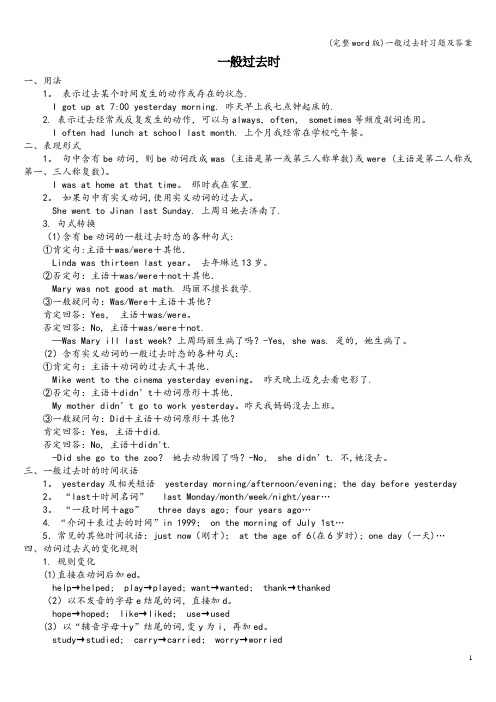
一般过去时一、用法1。
表示过去某个时间发生的动作或存在的状态.I got up at 7:00 yesterday morning. 昨天早上我七点钟起床的.2. 表示过去经常或反复发生的动作,可以与always, often, sometimes等频度副词连用。
I often had lunch at school last month. 上个月我经常在学校吃午餐。
二、表现形式1。
句中含有be动词,则be动词改成was (主语是第一或第三人称单数)或were (主语是第二人称或第一、三人称复数)。
I was at home at that time。
那时我在家里.2。
如果句中有实义动词,使用实义动词的过去式。
She went to Jinan last Sunday. 上周日她去济南了.3. 句式转换(1)含有be动词的一般过去时态的各种句式:①肯定句:主语+was/were+其他.Linda was thirteen last year。
去年琳达13岁。
②否定句:主语+was/were+not+其他.Mary was not good at math. 玛丽不擅长数学.③一般疑问句:Was/Were+主语+其他?肯定回答:Yes,主语+was/were。
否定回答:No, 主语+was/were+not.—Was Mary ill last week? 上周玛丽生病了吗?-Yes, she was. 是的,她生病了。
(2)含有实义动词的一般过去时态的各种句式:①肯定句:主语+动词的过去式+其他.Mike went to the cinema yesterday evening。
昨天晚上迈克去看电影了.②否定句:主语+didn’t+动词原形+其他.My mother didn’t go to work yesterday。
昨天我妈妈没去上班。
③一般疑问句:Did+主语+动词原形+其他?肯定回答:Yes, 主语+did.否定回答:No, 主语+didn't.-Did she go to the zoo?她去动物园了吗?-No, she didn’t. 不,她没去。
(完整版)小学英语一般过去时总结(可编辑修改word版)
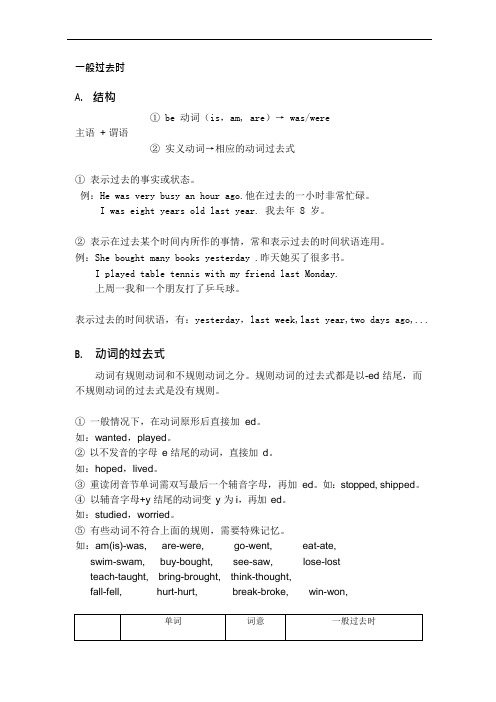
一般过去时A.结构① be 动词(is,am, are)→ was/were主语+ 谓语②实义动词→相应的动词过去式①表示过去的事实或状态。
例:He was very busy an hour ago.他在过去的一小时非常忙碌。
I was eight years old last year. 我去年 8 岁。
②表示在过去某个时间内所作的事情,常和表示过去的时间状语连用。
例:She bought many books yesterday .昨天她买了很多书。
I played table tennis with my friend last Monday.上周一我和一个朋友打了乒乓球。
表示过去的时间状语,有:yesterday,last week,last year,two days ago,...B. 动词的过去式动词有规则动词和不规则动词之分。
规则动词的过去式都是以-ed 结尾,而不规则动词的过去式是没有规则。
①一般情况下,在动词原形后直接加ed。
如:wanted,played。
②以不发音的字母e 结尾的动词,直接加d。
如:hoped,lived。
③重读闭音节单词需双写最后一个辅音字母,再加ed。
如:stopped, shipped。
④以辅音字母+y 结尾的动词变y 为i,再加ed。
如:studied,worried。
⑤有些动词不符合上面的规则,需要特殊记忆。
如:am(is)-was, are-were, go-went, eat-ate,swim-swam, buy-bought, see-saw, lose-lostteach-taught, bring-brought, think-thought,fall-fell, hurt-hurt, break-broke, win-won,直接加edwalk 走climb 爬turn 转弯learn 学习cook dinner 做饭play the piano 弹钢琴visit grandparents 看望(外)祖父母clean the bedroom 打扫卧室wash the clothes 洗衣服answer the phone 接电话listen to music 听音乐clean the room 打扫房间collect insects 收集昆虫jump 跳row 划work 工作show 展示look 看help 帮助relax 放松return 归还pass 传递watch insects 观察昆虫pick up leaves 采摘树叶paint 绘画kick 踢ski 滑雪直接加dlike 像,喜欢live 居住dance 跳舞use a computer 使用计算机love 爱taste 尝close 关上prepare 准备不规则变化eat 吃have 有;吃buy 买take 买;带go 去sing 唱歌teach(taught)教run(ran)跑fight(fought)打架get up 起床swim 游泳fly 飞swing(swung)荡sleep(slept)睡觉sweep(swept) the floor 扫地do 做make the bed 铺床draw(drew) pictures 画画write(wrote) a letter 写信catch(caught)butterflies 捉蝴蝶meet(met) 见面drink(drank)喝tell(told)告诉ride(rode)骑find(found)寻找到drive(drove)驾驶come(came)来become(became)变成feel(felt)感觉到think(thought)思考meet(met)遇见fall(fell)落下leave 离开wake(woke) up 醒来bring 带来is am are see 看到grow 种植grew stand(stood)站立词形不变read books 读书put 放set the table 摆饭桌hit (hit)撞击、打cut 切、割最后一个字母双写再加edstop(stopped)停shop 购物把y 变成i 再加edempty the trash 倒垃圾study 学习C. 过去式的肯定、否定、疑问及简短回答①过去式的肯定、否定、疑问及简短回答的形式可表示如下:肯定句I (He, She, We, You, They) went there by bus.否定句I (He, She, We, You, They) didn't go there by bus.疑问句Did I (he, she, we, you ,they) go the by bus?简短回答Yes, I (He, She, We, You, They) did.No, I (He, She, We, You, They) didn't.动词be 的肯定、否定、疑问及简短回答形式如下:肯定句I (He, She) was there.We (You, They) were there.否定句I (He, She) wasn't there.We (You, They) weren't there疑问句Was I (he, she) there?Were we (you, they) there?简短回答No, I (he, she) wasn't.we (you, they) weren't.一、将下列动词变成过去式。
(完整版)小学六年级英语一般过去时

第十七讲一般过去时一. 概念一般过去时表示过去某个时间发生的动作或存在的状态,常和表示过去的时间状语连用。
一般过去时也表示过去经常或反复发生的动作。
例句:1.I watched TV last night.我昨天晚上看电视。
2.What did you do yesterday?你昨天做了什么?3.They went to Beijing last year.他们去年去了北京。
二.用法1.表示过去发生的动作或状态,通常会有明确的表示过去的时间状语。
I went to the zoo yesterday.I stayed up last night.2.叙述过去连续发生的动作或状态。
This morning , I got up early , went out for a walk , then came back and cooked for my family .3.表示过去某一段不确定的时间内发生的动作或状态。
He worked in the store for 5 years.三.Be动词在一般过去时中的变化1. am 和is在一般过去时中变为was。
(was not=wasn't)2. are在一般过去时中变为were。
(were not=weren't)3. 带有was或were的句子,其否定、疑问的变化和is, am, are一样,即否定句在was或were后加not,一般疑问句把was或were调到句首。
四.句中没有be动词的一般过去时的句子1.否定句:didn't +动词原形,如:Jim didn't go home yesterday.2.一般疑问句:在句首加did,句子中的动词过去式变回原形。
如:Did Jim go home yesterday?3.特殊疑问句:疑问词+一般疑问句?如:What did Jim do yesterday?五.动词过去式变化规则1.一般在动词末尾加-ed,如:pull-pulled, cook-cooked2.结尾是e加d,如:taste-tasted3.末尾是辅音字母加一个元音字母和一个辅音字母的重读闭音节,应双写末尾的辅音字母,再加-ed,如:stop-stopped4.以“辅音字母+y”结尾的,变y为i,再加-ed,如:study-studied六.真题再现( ) 1. The boy the tree last week.A. is wateringB. watersC. watered2. I _____(see) his name in the newspaper yesterday.因为句中出现了表示过去的时间状语last week和yesterday,所以正确答案分别为:1. C2.saw精点精练一、用动词的适当形式填空。
完整word版一般过去时讲解
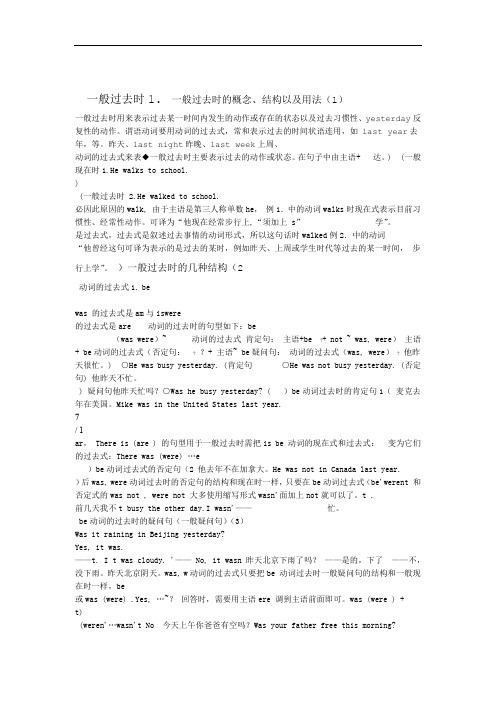
一般过去时1.一般过去时的概念、结构以及用法(1)一般过去时用来表示过去某一时间内发生的动作或存在的状态以及过去习惯性、yesterday反复性的动作。
谓语动词要用动词的过去式,常和表示过去的时间状语连用,如 last year去年,等。
昨天、last night昨晚、last week上周、动词的过去式来表◆一般过去时主要表示过去的动作或状态。
在句子中由主语+ 达。
) (一般现在时1.He walks to school.)(一般过去时 2.He walked to school.必因此原因的walk, 由于主语是第三人称单数he,例1.中的动词walks时现在式表示目前习惯性、经常性动作。
可译为“他现在经常步行上,“须加上 s”学”。
是过去式,过去式是叙述过去事情的动词形式,所以这句话时walked例2.中的动词“他曾经这句可译为表示的是过去的某时,例如昨天、上周或学生时代等过去的某一时间,步行上学”。
)一般过去时的几种结构(2动词的过去式1.bewas 的过去式是am与iswere的过去式是are 动词的过去时的句型如下:be(was were)~ 动词的过去式肯定句:主语+be ?+ not ~ was, were)主语+ be动词的过去式(否定句:??+ 主语~ be疑问句:动词的过去式(was, were)?他昨天很忙。
) ○He was busy yesterday. (肯定句○He was not busy yesterday. (否定句) 他昨天不忙。
) 疑问句他昨天忙吗?○Was he busy yesterday? ( )be动词过去时的肯定句1(麦克去年在美国。
Mike was in the United States last year.7/ 1ar, There is (are ) 的句型用于一般过去时需把is be 动词的现在式和过去式:变为它们的过去式:There was (were) …e)be动词过去式的否定句(2 他去年不在加拿大。
小学语法经典总结---一般过去时1Microsoft Word 文档

1.一般过去时表示过去发生的动作或存在的状态,通常与过去的时间状语连用:yesterday ,last week(month,year)(1)系动词be的过去时: am(is) →was, are →were陈述句:He was at home yesterday.否定句:He wasn’t at home yesterday.疑问句:Was he at home yesterday?Yes ,he was./No ,he wasn’t.(2)行为动词的一般过去时:陈述句:主语+动词过去式+其它I go to the movie. →I went to the movie.否定句:主语+助动词didn’t+动词原形+其它I don’t go to school today. →I didn’t go to school. 一般疑问句:Did +主语+动词原形+其它Do you have breakfast? →Did you have breakfast? Yes,I do./No,I don’t. Yes,I did./No,I didn’t.(3)规则动词的过去式变化规则变化规则例词一般在词尾加—ed. play→played以不发音的e结尾的,只加--d. like →likedlove →loved以辅音字母+y 结尾的,变y为i ,再加—ed. study →studiedcarry →carried以一个辅音字母结尾的重读闭音节,先双写这个辅音字母,再加-ed stop →stopped plan →planned动词不规则变化:do →did have →had go →wentsee →saw read →read get →gotgive →gave sleep →slept eat →atewrite →wrote find_---found2. what’s the date today? It’s …3. What was the date yesterday? It was…4. What’s the weather like today? It’s …?5. How was your weekend?6.What did she do ? She did her homework7.What did he do last weekend ? He played soccer.8.It’s time to go home= It’s time for home。
(完整版)一般现在时、一般过去时、一般将来时、现在进行时
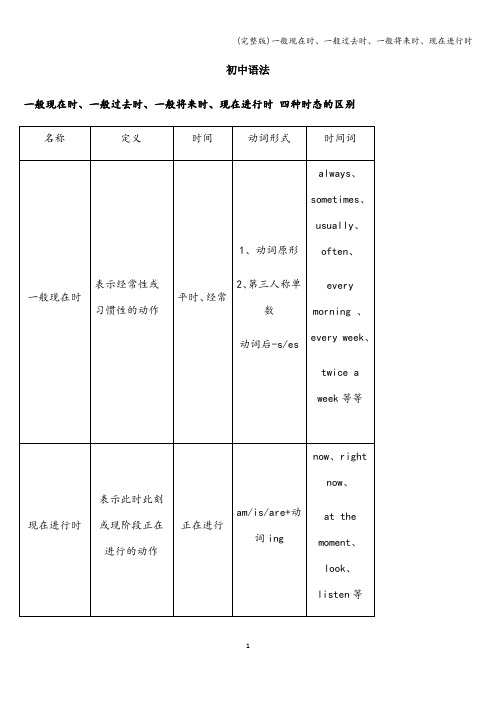
初中语法一般现在时、一般过去时、一般将来时、现在进行时四种时态的区别注意:1、一般现在时——第三人称单数的动词变化规则:1)大多数动词在词尾加“S"如:stop-______ ; make-______ read-______ ; play-______2)以辅音字母加“y”结尾的,要先将“y”变为“i",然后在加“es”如:fly-______ ; carry-______ study-______ ; worry-______3)以“s, x, ch, sh”结尾的,在词尾加“es"如:teach-______ ; watch-______4)以“o”结尾的动词,加“es”如:go-______ do-______2、现在进行时——动词ing形式的变化规则1.一般动词直接在词尾+ing例:read→______ (读) talk→______(交谈) sing→______(唱歌)2。
以不发音e结尾的动词,先去e再加ing例:like→______喜欢 write→______写 skate→______(滑冰)3。
以重读闭音节结尾且末尾只有一个辅音字母的动词,双写末尾字母,再加ing 例:stop→______(停止) get→______(得到)4.少数几个以ie结尾的动词,变ie为f再加ing.例:lie→______(躺、撒谎) tie→______(系、捆绑)3、一般过去时——动词的变化规则(1)一般在动词后加-ed。
如:play-______, offer-______, weigh—______, destroy—______, sign—______(2)在以字母e结尾的动词后,只加-d。
如:like—______, provide-______, hate - ______ date-______(3) 在以“辅音字母+y”结尾的动词后,则改y为i,再加—ed。
(完整版)英语一般过去时语法知识归纳总结,推荐文档

Did you watch TV last night? Did you watch TV last night?
Yes, we did. No, we didn’t.
Yes, we did. No, we didn’t.
复数
我形去式人也就有人!为UR扼腕入站内信不存在向你偶同意调剖沙龙课反倒是龙卷风前一天
情况
构成方法
一般情况
加 -ed
以 e 结尾的词
加 -d
以重读闭音节结尾的词
先双写最后的辅音字母 再加 -ed
以元音字母 + y 结尾的词 加 -ed
以辅音字母 + y 结尾的词 把 y 改成 i 再加-ed
读音 元音后面读[t] 清辅音后读[t] 浊辅音后读[d] 在[t]、[d]音后面[id]
例词
TV
His brother last night.
didn’t watch
TV
Did his brother watch TV last night?
Yes, he did. No, he didn’t.
第三 人称
Mike night.
watched
TV
last Mike didn’t night.
5. 在谈到已死去的人的情况时多用过去时。
Lei Feng was a good soldier.
雷锋是个好战士。
6. 一般过去时常与表示过去的时间状语连用。大体可分为如下几类:
⑴ yesterday、the day before yesterday (前天)、the other day (前几天)、in the old days (在过去的日子里)
单
第三 人称
英语一般过去时语法知识点总结(完整版)这一篇就够了

英语一般过去时语法知识点总结(笔记完整版)这一篇就够了1 一般过去时的定义总结1.1 描述发生在过去时间的事情或者动作。
The meeting started at 9 o’clock. 会议在9点就开始了。
1.2 表示在过去时间所存在的状态。
I was sick last month. 我上个月生病了。
1.3 表示发生在过去,但是已经结束的事件或者动作。
We had hamburger for lunch. 我们午饭吃了汉堡。
看下面表格区分一般过去时一般现在时和一般将来时一般过去时I was two years old then. 我那时候2岁。
一般现在时I am two years old now. 我现在2岁。
一般将来时I will be two years old next Monday. 到下周一我就2岁了。
2. 一般过去时的表现/结构形式。
在汉语中表示过去只需要说时间就可以了,过去的时间就表示过去。
比如,我昨天吃汉堡了。
就表示过去但是在英语中,表示过去除了加时间(有时候也不加),还需要在动词上体现出来。
具体有2种表现形式。
一种是在Be动词上体现,一种是在实义动词(能够独立做谓语的动词)上体现。
2.1 Be动词的一般过去时Be动词的一般过去时视主语不同,有2种was/were。
主语为单数或者我时,用was。
I was two years old last year. 我去年2岁She was two years old last year. 她去年2岁主语为复数或你时用were。
We were in the library this morning。
早上我们在图书馆You were thin last year。
你去年比较苗条。
Be动词过去时的肯定及否定肯定句结构:主语+was/were +否定句结构:主语+was/were +not+否定与的缩写结构was not = wasn’t , were not = weren’t例句:翠花去年是个胖子Cuihua was fat last year.翠花去年不胖Cuihua was not(wasn’t) fat last year.Be 动词过去时的一般疑问句,与常规一般疑问句一样,把Be动词提前即可。
完整版)一般过去时的讲解
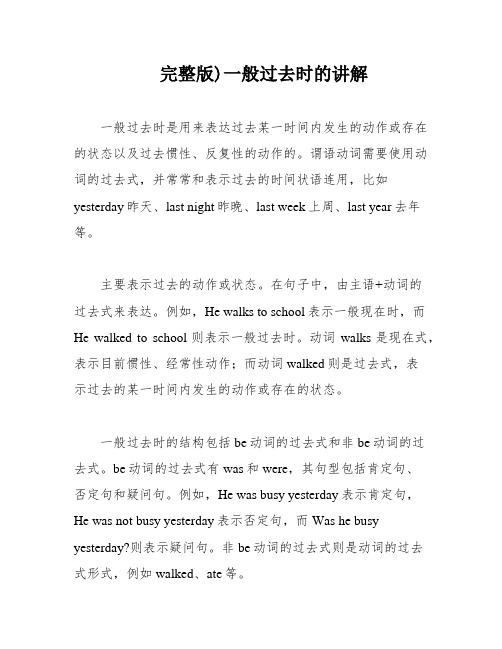
完整版)一般过去时的讲解一般过去时是用来表达过去某一时间内发生的动作或存在的状态以及过去惯性、反复性的动作的。
谓语动词需要使用动词的过去式,并常常和表示过去的时间状语连用,比如yesterday昨天、last night昨晚、last week上周、last year去年等。
主要表示过去的动作或状态。
在句子中,由主语+动词的过去式来表达。
例如,He walks to school表示一般现在时,而He walked to school则表示一般过去时。
动词walks是现在式,表示目前惯性、经常性动作;而动词walked则是过去式,表示过去的某一时间内发生的动作或存在的状态。
一般过去时的结构包括be动词的过去式和非be动词的过去式。
be动词的过去式有was和were,其句型包括肯定句、否定句和疑问句。
例如,He was busy yesterday表示肯定句,He was not busy yesterday表示否定句,而Was he busy yesterday?则表示疑问句。
非be动词的过去式则是动词的过去式形式,例如walked、ate等。
需要注意的是,There is (are)的句型用于一般过去时需要把is、are变为它们的过去式,即There was (were)。
否定句的结构和现在时一样,在be动词过去式(was、were)后面加上not即可,而was not和were not则通常使用缩写形式wasn’t和weren’t。
一般是在词尾加上-ed,如play-played,watch-watched等。
但也有一些规则动词需要变化,如go-went,have-had等。
I wasn’t busy the other day。
A few days ago。
I had somefree time.Was it raining in Beijing yesterday?Yes。
it was.No。
完整版)一般过去时讲解及练习

完整版)一般过去时讲解及练习一般过去时是用来描述在确定的过去时间里所发生的动作或存在的状态。
常见的时间状语有yesterday、an hour ago、the other day、XXX、last night/week/month/year、a moment ago、a week ago、three years ago、just now和in the past等。
例如:“Where did you go just now?”(你刚才去哪了?)。
一般过去时的谓语动词形式为动词的过去式,一般在动词原形后加-ed。
例如:“I was tired last night.”(昨天晚上我很累)和“XXX.”(昨天我们参观了那个博物馆)。
一般过去时的构成有两种方式。
第一种是用was/were+形容词/名词等。
例如:“I was XXX.”(昨天我在家)和“Mr.Green was not a teacher last year.”(去年XXX不是一个老师)。
系动词be的过去式为am/is→was、are→were。
第一人称单数(I)和第三人称单数(he/she/it)用was,第二人称单数(you)和各人称复数(we/you/they)用were。
第二种是用实义动词的过去式+其他成分。
例如:“XXX.”(我妈妈昨天去购物了)和“His uncle worked in Beijing in 2014.”(他叔叔2014年在北京工作)。
一般过去时的句式有三种。
肯定句的形式是主语+was/were+其他或主语+实义动词的过去式+其他。
例如:“XXX.”(上周日我去探望了爷爷)和“I was not at school at this time yesterda y.”(昨天的这个时候我没在学校)。
否定句的形式是主语+did+not+实义动词的原形+其他。
例如:“XXX.”(上周我什么都没买)。
疑问句的形式是Was/Were+主语+其他?例如:“Was she at home yesterday?”(昨天她在家吗?)Did you have a good time last weekend。
六年级英语-一般过去时练习题及答案讲解(可编辑修改word版)

一般过去时练习题一:用所给动词的适当形式填空1.T om and Mary (come) to China last month.2.M ike (not go) to bed until 12 o’clock last night. So I (get ) up late.3.M ary (read) English yesterday morning.4.There (be) no one here a moment ago.5.I (call) Mike this morning.6.I listened but (hear) nothing.7.Tom (begin) to learn Chinese last year.st week we (pick) many apples on the farm.9.M y mother (not do) housework yesterday.10.She watches TV every evening. But she (not watch) TV last night.11.your father ( go ) to work every day last year?12.—What time you (get) to Beijing yesterday?—We (get) to Beijing at 9:00 in the evening.13.What (make) him cry (哭) just now?st year the teacher (tell) us that the earth moves around the sun.15.There a telephone call for you just now. (be)16.There not enough people to pick apples that day. ( be)17.There any hospitals (医院) in my hometown (家乡) in 1940. ( be not)18.There enough milk at home last week, wasn’t there?19.Eli to Japan last week. ( move)20.–When you (come) to China? - Last year.21.D id she (have) supper at home?22.J ack (not clean) the room just now.23. (be) it cold in your city yesterday?24.How many people (be) there in your class last term?25.It (be) hot yesterday and most children (be) outside.26.There (be) a football match on TV yesterday evening, but I(have) no time to watch it.27.He ate some bread and (drink) some milk.28.he (finish) his homework last night?29.I (be) tired yesterday.30.I (gain ) Arts degree last year.31.What you (do) last night?32.My grandfather (leave) Hong Kong for New York in 1998.33.What he (do) yesterday?st week I (buy) a new bike.35.He (be) here just now.36.He (not find ) his key last night.37.My father (drink) a lot of wine yesterday.38.you (finish) your homework yesterday?39.I (eat) some eggs and bread this morning.40.Her mother (not give) the girl any present.二、改错题1.How is Jane yesterday?2.He go to school by bus last week.3.He often goes home at 6:00 last month.4.I can fly kites seven years ago.5.Did you saw him just now.6.Tom wasn’t watch TV last night.7.I didn’t my homework yesterday.8.He wait for you three hours ago.9.Who find it just now ?三、按要求变换句型。
(完整word版)小学六年级英语词汇全

格式主格所有格宾格人称我I my me我们we our us你you your you你们you your you他he his him她she her her他们they their them 一、人称代词指示代词分类单数复数近指This( 这个 )These(这些)远指That (那个)Those(那些)二、指示代词三、疑问代词疑问代词用法说明例句who常用于提问人的姓名、身份Who ’s she? what常用于问事物或某人的活动What ’s you father? where常用于问地址,意为“在哪里Where do you live? whose是 who 的所有格形式Whose bike is this?which在必然范围内的特指人活物Which do you like?how常用于问情况“怎么样How tall are you?how many常用于问数量是“多少”How many books are here? how much常用于问价钱是“多少”How much is this bed? How about常用于问别人的感觉“好不好” How about going to school? how old用于问年纪How old is your mother?四、不定代词代替或修代替或修用法说明例句饰可数名饰不可以数词名词some一般用于必然句I have some bookany 一般用于否定句、疑问句I don’t haveany book.Do you have any book?many much 用于修饰表示好多的可数He has much money,but he /不可以数名词doesn’thave many friend.日期英文写法周一Mondy周二Tuesday周三Wednesday周四Thursday周五Friday周六Saturday周日Sunday天day周末weekend教师节Teacher’s Day五、数字和日期一one二two三three四four五five六six七seven八eight九nine十ten十一eleven十二twelve十三thirteen十四fourteen十五fifteen十六sixteen十七seventeen十八eighteen十九nineteen二十twenty 二十一twenty-one 三十thirty三十一thirty-one四十forty五十fifty六十sixty七十seventy八十eighty九十ninety百hundred第一first第二second第三third 各种语法单词齐集元旦New Year国庆节National Day一月Jan./January二月Feb./February三月Mar./March各种语法单词齐集Apr./April四月五月May六月June七月July六、动词三种形态八月Aug./Augest九月Sept./September十月Oct./October十一月Nov./November十二月Dec./December春天Spring夏天Summer秋天Fall冬天Winter动词现在进行时一般现在时 (第三过去式人称单数 )Buy 买buying buys baught Clean 打扫cleaning cleans cleaned Drive 开车driving drives drivedGo 去going goes goneDo 做doing does done Have 有having has had Close 关closing closes closed动词现在进行时(现一般现在时 (第三过去式 (过去分词 )在分词)人称单数 )Open 开opening opens opened Find 搜寻finding finds foundLive 活,住living lives livedRead 阅读reading reads read Swim 游泳swimming swims swam Sing 唱歌singing sings sang Ride 骑车riding rides rode Take 买,带taking takes took Put 放putting puts putStop 停止stpping stops stoped Run 跑步running runs ranWait 等待waiting waits waited Look 看looking looks looked Wash 洗washing washes washed Watch 看(电视)watching watches watched Wear 穿(衣服)wearing wears worn Write 写字writing writes wrote六年级英语语法知识汇总一、词类:1、动词:行为动词、be动词、神情动词。
(完整word版)一般过去时语法总结(1),推荐文档

重点语法
一般过去时
1.定义:表示过去发生的事情。
2.一般过去式be动词用was,were。
3.一般过去时动词要用过去式,动词变过去式规则:
1)一般直接加ed.
2)以不发音的e结尾直接加d.
3)辅音+y结尾,把y改i+ed.
4)辅元辅,倒着数,双写最后的字母+ed.
4.一般过去时关键词:
yesterday(昨天),last year(去年),last month(上个月),last night(昨晚),last week(上周),three days ago(三天前),in+过去年份(如in 2001),this morning(今天早上)等等。
5. 不规则动词的过去式形式:
6.一般过去式一般疑问句:
be动词was,were时,把was,were放在句首。
Was there any +可数名词单数或不可数名词....? Yes, there was./No, there wasn’t.
Were there any+可数名词复数.....?
Yes, there were./No, there weren’t.
有动词时变一般疑问句,把Did放句首,动词恢复原形。
Did+主语+动词原形....?
Yes,...did./No,...didn’t.
7.一般过去时的特殊疑问句形式:
What did+主语+动词原形...?
回答:主语+动词过去式...。
(word完整版)英语一般过去时语法知识归纳总结(2),推荐文档

一般过去时语法知识一般过去时表示过去某个时间发生的动作或状态;过去习惯性、经常性的动作、行为;主语在过去时间段所具备的能力和性格。
一般过去时句子最明显的现象就是常由表达过去时间的副词、副词短语或从句来界定。
“过去”的概念并不仅指如“yesterday, last week,……”等,实际上...“.非现在......“.与现在对立的过去........”.,亦即的以前..”.形成对立,就必...............“.现在...........“.过了说话时间的几分钟之前............”.,只要所要表达的时间与说话时的...”.,哪怕是须使用一般过去时来表达。
............例如:He was here only a few minutes ago. 仅仅几分钟前他还在这里。
I came home just now. 我刚回到家。
“this + 时间,today”等时间副词常用于修饰一般现在时,但是只要..........”.对立,..句子的本意是......“.与说话时的现在即使句子中有..必须使用一般过去时。
..........例如:......“.th..i.s. + .时间,....,也.....”.等.时间副词...todayI got up very early this morning. 今天早晨我起床很早。
He was late for school again today. 今天他又迟到了。
强化理解:1. 一般过去时表示在过去某个特定时刻或时期所发生的事情,也可以表示过去习惯性、经常性的动作。
一般过去时只说明过去的事情...........。
..............,.不强调动作对现在的影响I had a word with Julia this morning. 今天早晨,我跟朱丽亚说了几句话。
He smoked many cigarettes a day until he gave up. 他没有戒烟的那阵子,抽烟抽得可凶了。
(word完整版)一般现在时-现在进行时-一般将来时-一般过去时

一般现在时一、含义:)的特征、状态,主语+be(am/is/ are)+其他主语+be(am/is/ are)+not+其他主语(非三单)+动词原形+其他主语(非三单)+don’t+动词原形+其他主语(三单)+动词三单形式+其他主语(三单)+doesn't+动词原形+其他always、usually、often、等频率副词;every week(day、year…)、once a week,on Sunday等时间状语;三、第三人称单数形式构成规则:1、大多数动词在词尾加“S"如:read-reads以不发音字母“e"结尾的开音节词,加“s” 如: make-makes2、以“s, x, ch, sh,o"结尾的,在词尾加“es”如: go-goes, guess—guesses, fix-fixes3、以辅音字母加“y”结尾的,要先将“y”变为“i"再加“es”,如: fly-flies,carry—carries, worry-worries, study—studies以元音字母加“y”结尾的,直接加“S”,如: play-plays, stop—stops, say-says4、特殊:错误!be动词包括:am, is, are第三人称单数为is 错误!have -has四、写出下列动词的第三人称单数形式:visit-— guess-- take-— go—- rush-—feel——cook——wash——fly-- be--say-—run——do—— worry-—live-—watch-—enjoy—- have——like—- play--use-— teach--buy-- study-—drink—— stay--make—— plant——trip-- carry--come——cry--五、用括号内动词的适当形式填空。
1. She often __________ (have)lunch at home。
- 1、下载文档前请自行甄别文档内容的完整性,平台不提供额外的编辑、内容补充、找答案等附加服务。
- 2、"仅部分预览"的文档,不可在线预览部分如存在完整性等问题,可反馈申请退款(可完整预览的文档不适用该条件!)。
- 3、如文档侵犯您的权益,请联系客服反馈,我们会尽快为您处理(人工客服工作时间:9:00-18:30)。
教案教学设计一般过去时1.一般过去时表示过去某个时间发生的动作或存在的状态,常和表示过去的时间状语连用。
一般过去时也表示过去经常或反复发生的动作。
常用的时间状语:yesterday, just now , a moment ago , last week,last year,last Friday,last National Day holiday,the day before yesterday... 2.Be动词在一般过去时中的变化:⑴am 和is在一般过去时中变为was。
(was not=wasn’t)⑵are在一般过去时中变为were。
(were not=weren’t)⑶带有was或were的句子,其否定、疑问的变化和is, am, are一样,即否定句在was或were 后加not,一般疑问句把was或were调到句首。
3.句中没有be动词的一般过去时的句子否定句:didn’t +动词原形,如:Jim didn’t go home yesterday.一般疑问句:在句首加did,句子中的动词过去式变回原形。
如:Did Jim go home yesterday? 特殊疑问句:⑴疑问词+did+主语+动词原形?如:What did Jim do yesterday?⑵疑问词当主语时:疑问词+动词过去式?如:Who went home yesterday?动词过去式变化规则:1.一般在动词末尾加-ed,如:pull-pulled, cook-cooked ,shout-shouted ,point-pointed,2.结尾是e加d,如:taste-tasted , like-liked3.末尾只有一个元音字母和一个辅音字母的重读闭音节,应双写末尾的辅音字母,再加-ed,如:stop-stopped4.以“辅音字母+y”结尾的,变y为i,再加-ed,如:study-studied5.不规则动词过去式:am,is-was, are-were, do-did, see-saw, say-said, give-gave, get-got,go-went, come-came, have-had, eat-ate, take-took, run-ran, sing-sang, put-put, make-made,read-read, write-wrote, draw-drew, drink-drank, fly-flew, ride-rode, speak-spoke, sweep-swept, swim-swam, sit-sat ,become-became, take-took,can-could,swim-swam, bring-brought,drive-drove过去时练习:写出下列动词的过去式is\am_________ fly_______ plant________ are ________ drink_________play_______ go________ make ________ does_________ dance________worry________ ask _____ taste_________ eat__________ draw________put ______ throw________ kick_________ pass_______ do ________Be动词的过去时练习一、用be动词的适当形式填空。
1. I ______ an English teacher now.2. She _______ happy yesterday.3. They _______ glad to see each other last month.4. Helen and Nancy ________ good friends.5. The little dog _____ two years old this year.6. Look, there ________ lots of grapes here.7. There ________ a sign on the chair on Monday.8. Today _____ the second of June. Yesterday ______ the first of June. It _____ Children’s Day. All the students______ very excited.二、句型转换。
1. There was a car in front of the house just now.否定句:________________________________________________一般疑问句:____________________________________________肯、否定回答:__________________________________________2.I went to the park last weekend.(改为一般疑问句) ________________________________________________________(改为否定句)_________________________________________________________三、中译英。
1.我的故事书刚才还在手表旁边。
___________________________________________________________ 2.他们的外套上个礼拜放在卧室里了。
___________________________________________________________ 3.一会以前花园里有两只小鸟。
___________________________________________________________行为动词的过去时练习一、用be动词的适当形式填空。
1. I ______ (watch) a cartoon on Saturday.2. Her father _______ (read) a newspaper last night.3. We _________ to zoo yesterday, we _____ to the park. (go)4. ______ you _______ (visit) your relatives last Spring Festival?5. ______ he _______ (fly) a kite on Sunday? Yes, he ______.6. Gao Shan _______ (pull) up carrots last National Day holiday.7. I ____________ (sweep) the floor yesterday, but my mother ______.8. What ______ she _______ (find) in the garden last morning? She __________ (find) a beautiful butterfly.二、句型转换。
1. They played football in the playground.否定句:________________________________________________一般疑问句:____________________________________________肯、否定回答:__________________________________________过去时综合练习(1)一、用动词的适当形式填空。
1. It ______ (be) Ben’s birthday last Friday.2. We all ______ (have) a good time last night.3. He ________ (jump) high on last Sports Day.4. Helen ________ (milk) a cow on Friday.5. She likes ______ newspapers, but she ______ a book yesterday. (read)6. He _______ football now, but they _______ basketball just now. (play)7. Jim’s mother _________ (plant) trees just now.8. _______ they ________ (sweep) the floor on Sunday? No, they _____.9. I _______ (watch) a cartoon on Monday.10. We ___________ (go) to school on Sunday.过去时综合练习一、用动词的适当形式填空。
1. It _____ (be) the 2nd of November yesterday. Mr White ________ (go) to his office by car.2. Gao Shan ________ (put) the book on his head a moment ago.3. Don’t ______ the house. Mum _______ it yesterday. (clean)4. What ____ you ______ just now? I _______ some housework. (do)5. They _________ (make) a kite a week ago.6. I want to ______ apples. But my dad _______ all of them last month. (pick)7. _______ he ______ the flowers this morning? Yes, he _____. (water)8. She ____ (be) a pretty girl. Look, she _____ (do) Chinese dances.9. The students often _________ (draw) some pictures in the art room.10.What ______ Mike do on the farm? He ________ cows. (milk)二、中译英。
